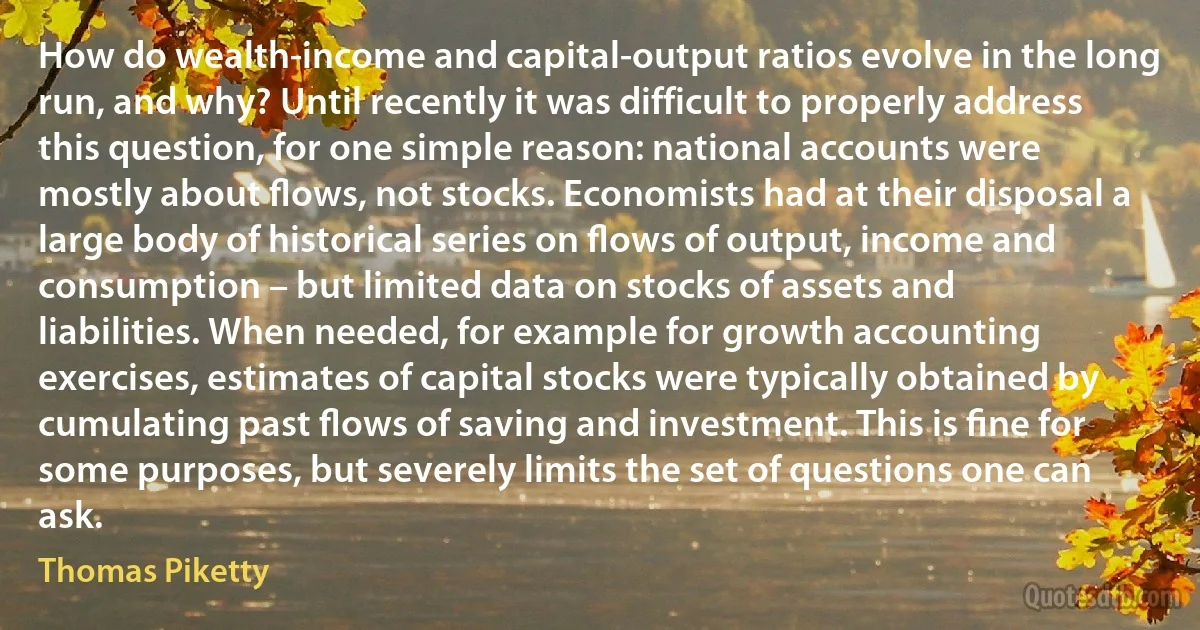
How do wealth-income and capital-output ratios evolve in the long run, and why? Until recently it was difficult to properly address this question, for one simple reason: national accounts were mostly about flows, not stocks. Economists had at their disposal a large body of historical series on flows of output, income and consumption – but limited data on stocks of assets and liabilities. When needed, for example for growth accounting exercises, estimates of capital stocks were typically obtained by cumulating past flows of saving and investment. This is fine for some purposes, but severely limits the set of questions one can ask.
Thomas PikettyRelated topics
ask assets body consumption datum disposal example fine historical large liabilities limited national output past question reason run series set simple questionsRelated quotes
Four years ago a large part of the civilised world laboured under certain biological fallacies which may, in a sense, be held responsible for the extent and duration of the present conflict. These fallacies, which were the foundation of pacifism and other pernicious forms of social and political radicalism, dealt with the capacity of man to evolve mentally beyond his former state of subservience to primate instinct and pugnacity, and to conduct his affairs and international or interracial relations on a basis of reason and good-will. That belief in such capability is unscientific and childishly naive, is beside the question.

H. P. Lovecraft
All of these politicians that I'm running against now, they're trying to disassociate. I mean, you looked at Bush, it took him five days to answer the question on Iraq. He couldn't answer the question. He didn't know. I said, "Is he intelligent?" Then I looked at Rubio. He was unable to answer the question, is Iraq a good thing or bad thing? He didn't know. He couldn't answer the question. How are these people gonna lead us? How are we gonna - how are we gonna go back and make it great again? We can't. They don't have a clue. They can't lead us. They can't. They can't even answer simple questions. It was terrible.

Donald Trump
Whenever the rate of return on capital is significantly and durably higher than the growth rate of the economy, it is all but inevitable that inheritance (of fortunes accumulated in the past) predominates over saving (wealth accumulated in the present). ... The inequality r > g in one sense implies that the past tends to devour the future: wealth originating in the past automatically grows more rapidly, even without labor, than wealth stemming from work, which can be saved. Almost inevitably, this tends to give lasting disproportionate importance to inequalities created in the past, and therefore to inheritance.

Thomas Piketty
If it recedes one day, leaving behind its works and signs on the shores of our civilization, the structuralist invasion might become a question or the historian of ideas, or perhaps even an object. But the historian would be deceived if he came to this pass: by the very act of considering the structuralist invasion as an object he would forget its meaning and would forget that what is at stake, first of all,, is an adventure of vision, a conversion of the way of putting questions to any object posed before us, to historical objects-his own- in particular. And, unexpectedly among these, the literary objects.

Jacques Derrida
Questions of convergence under an infinite time horizon will depend so much on epsilontic refinements in the system of assumptions - and on the infinite constancy of these refinements - that we are humanly speaking absolutely certain of getting infinite time horizon results which have no relevance to concrete reality. And in particular we are absolutely certain of getting irrelevant results if such epsilontic exercises are made under the assumption of a constant technology. 'In the long run we are all dead.' These words by Keynes ought to be engraved in marble and put on the desk of all epsilontologists, in growth theory under an infinite horizon.

Ragnar Frisch
